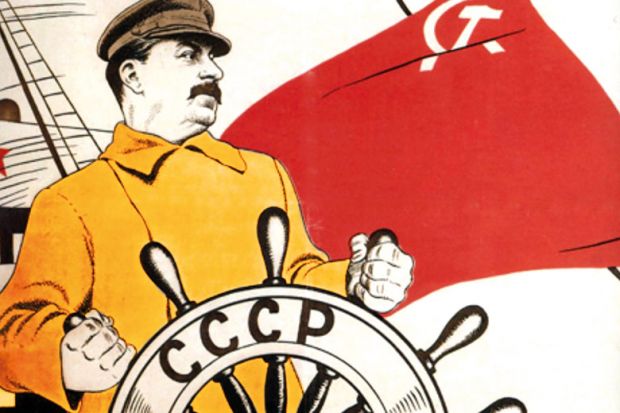Since the first Russian university emerged almost 300 years ago, the country’s higher education system has almost always been a state project. Not only has the government largely – and sometimes completely – financed institutions, it has also defined their missions, set their goals (including student enrolment quotas for each discipline) and closely monitored their performance.
Periods in which universities had some degree of autonomy were short-lived, while changes of political regimes led to radical restructurings of the system.
The most sweeping changes came in the early years of Bolshevik rule, and many people see similarities between what is happening in Russia now and what happened in the 1920s and ’30s. We should be cautious about drawing historical parallels too closely, but some of the logic and trends do seem familiar.
Campus views: Russia’s intellectual isolation presents opportunities for Central Asian HE
Those trends include more government control over academic research, directing research institutions and universities to address military and defence priorities. They also include the increasing political persecution of academics and students who oppose the government’s agenda (particularly the war in Ukraine) and the stark reversal of an internationalisation process that the government previously championed, at both the institutional and the individual levels.
There is a rapid decline in Russian universities’ contacts with the US and Europe, driven by a fear of being blamed for “cooperation with enemy”. But the animus is bilateral of course: after the outbreak of war, and especially after the Russian rectors’ letters of support for it, universities in many countries ceased cooperation with Russian institutions.
Hence, Russia is abandoning its previous emphasis on publications in leading international journals when assessing institutional and individual research achievements, replacing it with a focus on local Russian journals. The term “sovereign science” is beginning to dominate discourse about research policy.
Universities are also experiencing a significant brain drain, at both senior and early-career ranks. In some cases, the departures are due to dismissal for expressing anti-war views; in others, they are an expression of such views by individuals. Either way, they affect the quality of Russian education and research.
Some, though by no means all, of the departing faculty are non-Russians who had been drawn to leading Russian universities by the 5-100 programme, a government-funded excellence initiative that ended in 2020. One of its metrics of institutional progress was share of international faculty and students, so universities prioritised this.
At the same time, we cannot say that internationalisation has been totally abandoned. Russia is still seeking to recruit international students – but now from different regions. The goals of internationalisation have become more political than academic. In many ways, it is a return to the Soviet model, which saw attracting international students and international cooperation as a tool of political influence – and which tightly controlled both.
The consequences of isolation will be enormous for both science and education in Russia, though it will vary by discipline. The state views universities as a powerful resource for solving its problems, so the STEM subjects, which have strong traditions and institutions in Russia, will probably follow the Soviet path, receiving significant resources to focus on military applications.
For the social sciences, the consequences of isolation will be more significant. The absence of academic freedom and the pressure on the research agenda – manifested through personnel policies and the distribution of funding – will make it extremely complicated to pursue research on many topics.
Moreover, the social sciences in Russia are still relatively young. Their rapid development in recent decades has been associated with international cooperation and the inclusion of Russian researchers in networks of international cooperation. If all of that unravels, the progress could seriously stall.
Significant changes are also taking place in curricula. It has already been announced that, starting from the next academic year, all students will have to take a course on the “foundations of Russian statehood”. This means that ideology is being systematically imposed in Russian universities; a system of patriotic education is being recreated.
It is difficult to predict the impact of this ideological push on individual academic programmes. However, since certain topics and authors are now off-limits and access to literature databases is shrinking, that impact is unlikely to be subtle. Again, these restrictions are a return to the Soviet past.
So too is the lack of any kind of consultation over policy. Decisions that will greatly alter the landscape of the education system are often made overnight by presidential/governmental decree without any prior discussion with the university community, making horizon-scanning very difficult.
But what we can say is that even during the 30 years of the market economy that followed the collapse of the Soviet Union, Russia’s higher education system retained many elements of the planned system. Now these elements may be ramped up again as Russian universities’ educational and intellectual missions are subordinated to the task of addressing the priorities of the military.
Maria Yudkevich is a researcher in comparative higher education. Until recently, she was a professor and vice-rector for research at HSE University in Moscow. Her book, Higher Education in Russia, co-authored with Yaroslav Kuzminov (Johns Hopkins University Press, 2022), analyses Russian higher education from its beginnings until the pre-invasion period.
Register to continue
Why register?
- Registration is free and only takes a moment
- Once registered, you can read 3 articles a month
- Sign up for our newsletter
Subscribe
Or subscribe for unlimited access to:
- Unlimited access to news, views, insights & reviews
- Digital editions
- Digital access to THE’s university and college rankings analysis
Already registered or a current subscriber? Login








